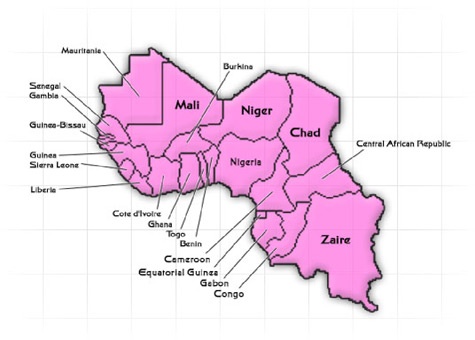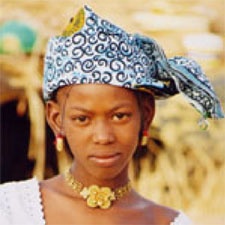Overview
West and Central Africa embraces twenty-four countries with more than five hundred least-reached people groups remaining. The countries of Senegal, Mali, Guinea, Gambia, Mauritania and Niger lead the way with over eighty percent of their populations least-reached. Still, in terms of number of people Nigeria has over forty-five million people least-reached, although they represent only 34.7% of the total population of that nation. Islam had already reached the powerful tribes of West Africa long before the French colonized much of the region during the nineteenth century. For many centuries, Islam was the religion of the chiefs and elite since Arabs were primarily interested in profiting from the slave trade—not in making converts. When slavery was forbidden by the colonial powers, Islam spread faster in fifty years than it had in the previous eight centuries. Yet, Islam here may also include animistic traditional religions and practices. Voodoo, fetishes, ancestor worship and idolatry are found here.
 |
The Church has grown rapidly, especially in places like Nigeria which is now a sending base for missionaries to other continents. Two of the major missionary-sending churches are Redeemed Christian Church (which has two million members) and Deeper Life Bible Church (which has over 450,000 members). However, a great challenge remains even in their midst. AIDS in Africa now overshadows the future of the entire continent. Add to that the specter of poverty and one sees the great obstacles those in this region face. Pray that God empowers our brothers and sisters in this region to rise to the challenge with good news and works which lead to transformation.
Prayer Points
- Miracles of Healing and Deliverance. Pray that miracles of healing and deliverance even for those battling HIV/AIDS would open doors for faith.
- Power over the Demonic Activity. Pray that believers walk in the Holy Spirit’s power over all demonic depression, oppression and attraction of every sort, demonstrating that Jesus is truly king of kings and Lord of lords.
- Once for all Sacrifice. Pray that least-reached peoples recognize that Jesus is the lamb of God, the once-for-all sacrifice that forgives all our iniquities and heals all our diseases and that they apply this finished provision to their lives.
- Binding of all Backlash of the Enemy. Pray that believers apply their authority in Jesus Christ to bind all backlashes of the enemy as they work to penetrate the strongholds of darkness to deliver the captives and see them transferred to the kingdom of light.
- Breaking Generational Curses. Pray that generational curses that have come as a result of idolatry, immorality, injustice and independence from God will be broken and believers will walk in the true freedom of Jesus Christ as a testimony to those who do not yet believe.
Links
- Resources to pray and to mobilize prayer and outreach.
- Discover West and Central Africa’s least-reached peoples.
- Pray for the peoples of this region.
- Obtain daily prayer guides for peoples of this region.

Background
|
|
Islam Advances Across Africa like a Mighty Army
(Prepared by Keith Carey and the Ethne staff, for the Global Prayer Digest)
In West Africa, you will find voodoo, fetishes, ancestor worship and idolatry. But most of the least-reached peoples are adherents to Islam. There are historical reasons for this. For many centuries Islam was the religion of chiefs, sub-chiefs and the elite. Arabs who were making huge profits in the slave trade were not interested in making converts since the Quran explicitly forbids the taking of Muslims as slaves. When slavery was forbidden by the colonial powers, Islam spread faster in fifty years than it had in the previous eight centuries.
In plotting the progress of Islam across Africa, one becomes aware that Islam followed the established trade routes and pilgrimage route of Muslims on the Hajj (one of the Five Pillars of Islam) to Mecca, which is required of all Muslims once during their lifetime. Often they settled for several years in a town to make enough money to continue their journey. They were quick to start Quranic schools with paying students. Africans were attracted to their affluence and sent their children to school. If a prominent African converted to Islam, the individual was given many substantial gifts and assured that he had a trade route to the north and the west. If he was a tradesman, he could break the barrier into trades, which had been monopolized by Muslims.
Islam in Africa can best be described as only the Five Pillars of Islam on top of their animistic traditional religions. In a unique fashion, Islam is very appealing to the tribal people of Africa as it does not require them giving up any of their customs or cultures.
In West Africa, you will find voodoo, fetishes, ancestor worship and idolatry. But most of the least-reached peoples are adherents to Islam.
What does Christianity have to offer people bound by fear of curses and illness, misfortune or death brought on by interpersonal relationships gone awry? We have a God who is greater than all the gods. We have a God who is all-knowing, all powerful, ever present and able to take a broken sinner and create a new creature with eternal life who no longer needs to fear the ancestors or nature spirits. Pray that the folk Islamic peoples of Africa will see the need to recognize Jesus for who he is.
The Fulani: The Peoples Who Define West Africa
(Prepared by Mike Hughes for the Global Prayer Digest)
With a population of about twenty million, the Fulani peoples of West Africa are generally considered the largest nomadic people group in the world (although since they are nomadic it is hard to have an accurate estimation of their numbers). They are geographically spread across the width of West Africa from Senegal in the west to Chad and Cameroon in the east. No one is sure of their origins. Many think they may have migrated from the region around Egypt or Somalia, as they have a much stronger resemblance to these people than to their other West Africa neighbors. In more recent history they have spread east from Senegal under the Sahara Desert and generally have embraced Islam from the Arabic traders coming across the desert.
The Fulani are traditionally cattle herders and have lived nomadic or semi-nomadic lives taking their animals to find pasture, hence their dispersion across West Africa. While there are many similarities between the Fulani who live in different countries, they have also adapted to each locality. There are roughly fourteen different dialects of the language spoken by the Fulani, but all have a common root. Generally the Fulani are proud of their culture, and Islam is firmly embedded as part of this culture. Because of their nomadic or semi-nomadic lifestyle they live in hard to reach places. Both of these factors contribute to making the Fulani peoples unreached with the gospel. ![]()
My wife and I work among the Fulani of Niger, so I will share some of the distinctive attributes of this sub-group of the Fulani people. The Fulani of Niger are thought to number around one million (about ten percent of Niger’s population) and are spread across the country. Linguistically and historically they can be split into two groups, the Western Niger Fulani, who live around the Niger River Valley and migrated from Mali through Burkina Faso, and the Eastern Niger Fulani, who took a longer migration path from Mali via Benin, Nigeria and then up into Niger. Both groups number about 500,000 and would only have several hundred Christians among them. Two separate Bible translations are underway with a joint partnership between SIM and Wycliffe Bible Translators. To date several books of the New Testament have been published in both dialects. Last year the JESUS Film was produced for both dialects. There have been two national Christian conferences for workers among the Fulani and Fulani believers. At one of them there were around two hundred believers from all over the country gathered for worship, teaching and encouragement.
A number of mission groups work among the Fulani. However, all of us feel insignificant among such a large population of dispersed people. There are few places where the Fulani are a majority. In the same way, there are only one or two churches that could be called Fulani. Most Fulani believers are isolated from one another. Many join churches from other people groups. Literacy rates in Niger are about fourteen percent, but they are even lower among the Fulani; therefore, oral methods of evangelism and discipleship are necessary to form the development of a church among them.
There are few places where the Fulani are a majority. In the same way, there are only one or two churches that could be called Fulani. Most Fulani believers are isolated from one another.
The Fulani have a strong adherence to their particular cultural values, and are often described as proud people. Even in the face of increasingly difficult climatic conditions for their farming and herding lifestyle, they stick tenaciously to their way of life and values. Islam has become part of this value set, although it was not always this way. Consequently, the Fulani of Niger are often among the poor and marginalized and are slow to adapt or change. This means Christianity has been slow to take root. Outwardly many would admit that the claims of the Bible are true; however, many will face social ostracism for becoming a Christian.
Niger was featured in the world news in 2005 when they had a food crisis. This is not a new thing for Niger, and the Fulani are always badly affected by the variances in the rainfall. Many Fulani families lost most or all their animals and most are still in debt from having to pay very high prices for grain to feed their families. The Fulani of Niger are a needy people in all senses of the term.
Please pray that they will soon experience the truth and peace that only comes through Christ, and that a Fulani church would rise up among them that would reflect Christ in a way that is also Fulani.

